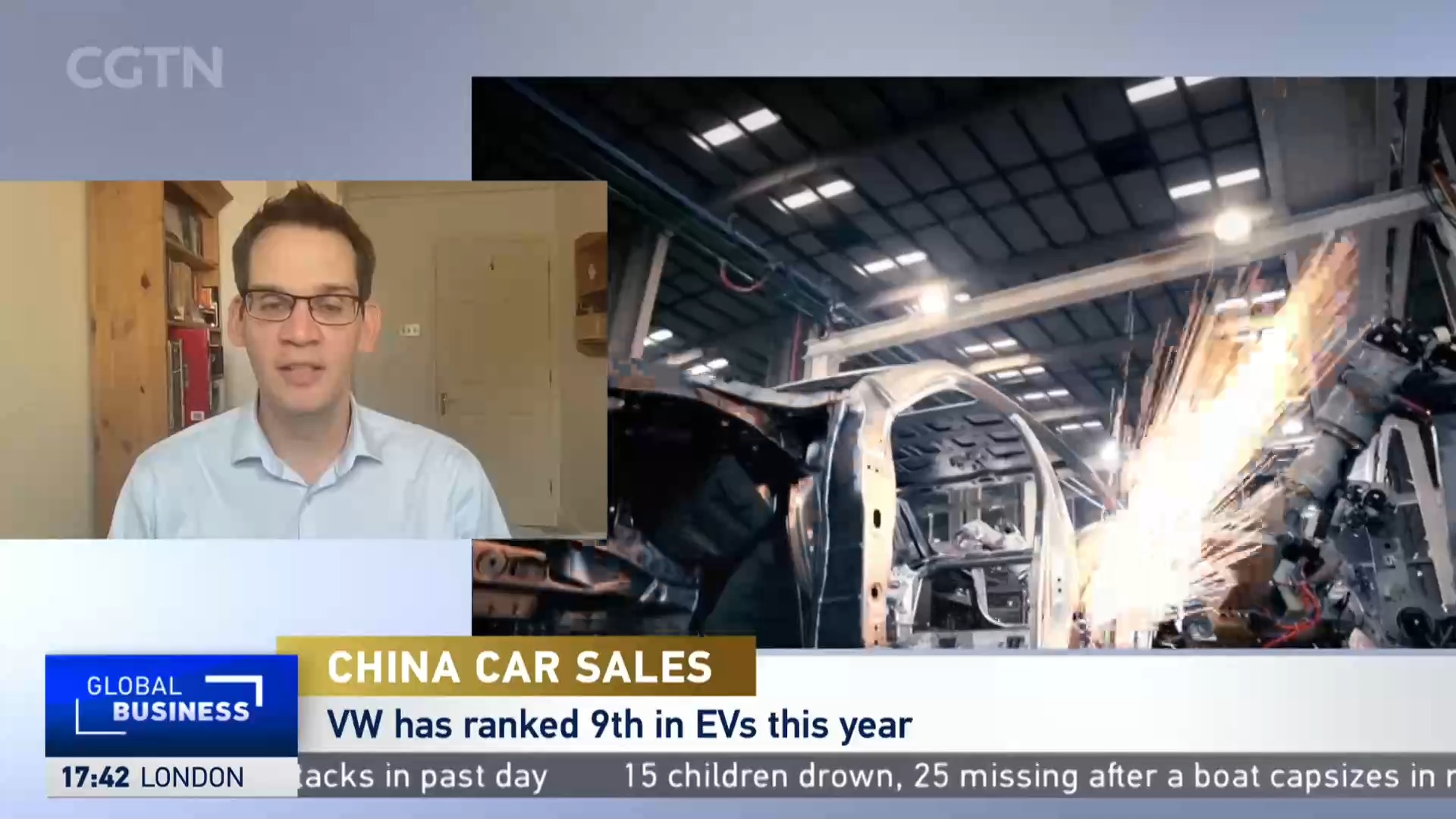04:14

China is winning the battle to establish dominance of the electric car vehicle market and western carmakers must act fast to avoid being left trailing in the slow lane.
That's the message from leading British automotive industry expert Jim Holder as Chinese carmakers led by BYD overtake established foreign giants like Volkswagen, Nissan and Honda in the country's domestic market.
Recent figures show that Chinese-owned automakers account for more than half of the country's domestic market. Volkswagen, formerly the leading car brand in China, was left in third place in the growing EV market.
READ MORE
Chinese EV manufacturers confident about road ahead in European market
Chinese electric vehicle maker NIO launches in European Union
Chinese EV manufacturer XPeng targets 'attractive' European market
Holder told CGTN Europe that Chinese carmakers have been planning for the electric car transition for decades, while their foreign competitors were asleep at the wheel. "They (China) saw their opportunity in electrification to leapfrog the established players," he said.
"They had tried and failed with combustion engines to get a hold not only in their home market, but also their markets abroad. They saw this opportunity coming and they invested heavily, they invested early."
Holder added: "They (Chinese firms) have the raw materials. They have access to what they need in order to succeed in this market, and now not only are they successful at home, they are starting to launch their plans abroad. We're seeing that here in Europe, particularly with BYD."
BYD became the world's largest electric car maker this year, overtaking Tesla, primarily by producing "very high quality products at a very competitive price," says Holder.
He believes established brands are "staring in the abyss" and having an "existential crisis."
Holder said: "We've seen some moves in America, in particular, to try and stimulate investments in electric vehicles from homegrown manufacturing. But at the moment China has the advantage and we are leaving the door open for them to come and take all."

BYD saw 211 percent production growth in 2022. /CFP
BYD saw 211 percent production growth in 2022. /CFP
BYD saw its global production grow by a staggering 211 percent between 2021 and 2022, from just shy of 600,000 vehicles to a whopping 1.86 million. By comparison, Tesla saw growth of 40 percent to 1.31 million, while VW grew a mere 10 percent.
Holder believes that BYD can afford to invest more in research and development now it has taken such a large market share. He said: "Those profits drive the R&D investment of the future, and that can be cyclical as a result of who's winning and who's losing. You underestimate the likes of BYD and other Chinese carmakers at your peril."
BYD makes five of the top ten selling EV models in China - the Song, Qin Plus, Tang, Dolphin, and Han.
By growing its dominance in their home market, Holder believes Chinese carmakers, including SAIC-GM-Wuling, Chery, Li Auto and NIO, will invest their profits in an aggressive pursuit of global markets.

Tesla has been overtaken as the world's largest EV producer. /CFP
Tesla has been overtaken as the world's largest EV producer. /CFP
That will take some effort, though. A recent report by Jato Dynamics showed Chinese-built cars accounting for just 2.7 percent of all cars registered in Europe, down from 2.9 percent in February 2022.
Upon the report's release, Jato global analyst Felipe Munoz said: "The entrance of Chinese vehicles into Europe is not taking place as quickly as many expected. There is clearly more work to be done on the models, production and marketing plans before these brands can successfully expand into the region."
But Holder believes this may not remain the case, saying that European carmakers have become complacent by relying on brand recognition alone and "need to move fast."
He said: "For decades they have scooped massive profits in China by being able to rely on selling the various qualities of Western brands. But they're now perceived as having moved too slowly into the age of electrification. This once in a generation shift is already well underway."
Subscribe to Storyboard: A weekly newsletter bringing you the best of CGTN every Friday